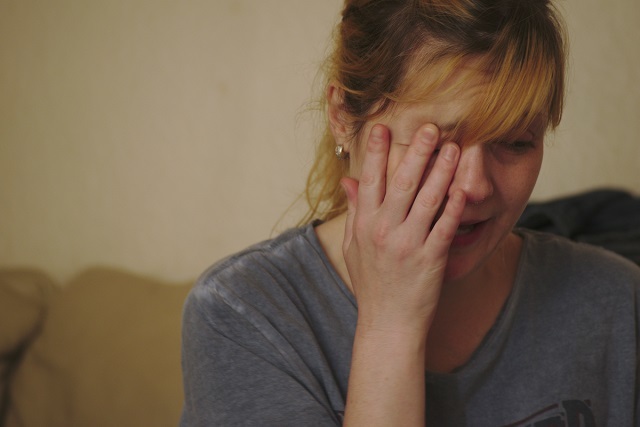The housing crisis is something we're all familiar with. But what is often forgotten among the litany of depressing statistics is the human stories of those most affected by the lack of housing. Often it's women and children who are hardest-hit — living in temporary accommodation, having to move away from their support network and schools, being pushed around from one council to another like a problem no-one wants to deal with.
The Other Half is a collection of photo stories taken over the last two years by Cinzia D'Ambrosi exposing the realities of women and children in temporary accommodation in London. The project shows the displacement and detachment of those hit hardest by the economic crisis and housing shortage. Often suffering in the wake of a marriage breakdown, from domestic abuse or poverty and unable to meet the twin demands of work and child care, the presence of women among those homeless and in temporary shelters is increasing. Here, we look at the stories of three women D'Ambrosi met and photographed.
Francesca

After living for six years in a temporary flat in west London, Francesca, a single mum with two children and pregnant with a third, was unexpectedly given a notice to leave in June 2013. Soon after, Hammersmith and Fulham council sent her an offer for an alternative temporary accommodation in Bromley-by-Bow. For Francesca, working as an hairdresser from home, this was a no-win situation. It meant losing her clients and her income. It meant losing vital support from friends and disrupting her children’s schooling and lives. She turned down the offer, convinced that the council would hear her case. That decision created a nightmare, with the council refusing to assist her at all. On top of this, it notified her that she no longer had a legal right to stay in the house she was living in. Francesca took her case to the Citizen’s Advice Bureau and her local MP, but to no avail.
In December 2013, following months in limbo, she says the council gave her just 12 hours to pack up all her belongings and leave. She was given nowhere to go, so Francesca found herself homeless with two young children. For hours she asked for help at the council office, and only after the intervention of MP Lisa Gorman, was she granted a three-week stay in an emergency hotel room in Slough, miles away from the area and her children’s school. Though pregnant, Francesca had a daily journey of four hours taking her children to school and back. She was alone, traumatised and trying to protect her children from further stress. Continuously pleading her case led to the realisation that her pregnancy was an issue that could not be overlooked, and finally she was housed in temporary accommodation in Ealing. She has one year in this temporary flat, but might again be left homeless, her long-term future still uncertain.
Linda

Originally from Trinidad, Linda is the single mother of a seven-year old daughter and also the main carer of her elderly mother. She has been waiting several years for the Home Office to decide whether she has the right to remain permanently in the UK. Until November 2014 she was living in a small flat that she rented from an uncle. Out of the blue, she received a notice of eviction. Her confused residency situation meant she was not eligible for housing assistance so Linda, her mother and daughter moved to a hostel while her situation is resolved with the Home Office. She had to give away most of her belongings as there wasn't enough room for them in the hostel. She is now receiving help from a law centre to make her case.
Since 2000, the UK has had a steady increase in the number of evictions. According to the Ministry of Justice, 37,739 private and public sector tenants in 2013 saw their homes repossessed by court bailiffs. The 2014 statistics are not yet complete but show significant rises. Behind each statistic lies a whole set of events conspiring to leave people like Linda struggling to cope.
Frieda

A woman we will call Frieda because she did not want to give her real name is a mother of two who became homeless after a relationship broke down. Brent Council stepped in to offer her a flat in Newham, but this was a borough on the other side of London to where she was living. It was meant to be only a provisional stay but Frieda remains in this accommodation several years later. She says she's tried hard to be relocated back to the part of Brent where she knows people and has roots. She believes that the mental health problems she now experiences are largely a result of prolonged isolation and the instability of her housing.
Frieda is an example of how councils can look after the most basic needs of mothers and children regarding their housing yet can neglect their overall well-being. The closure of women’s refuges and reduction in availability of mental health services only exacerbates this situation. Women, including teenagers and single mothers, are often offered unsuitable accommodation and then abandoned in locations where they have no support or connections. This kind of outcome increases the potential for mental health problems, which is, sadly, silently becoming a major issue among homeless women.
By Cinzia D'Ambrosi
For more of D'Ambrosi's photo-journalism visit her website here.



